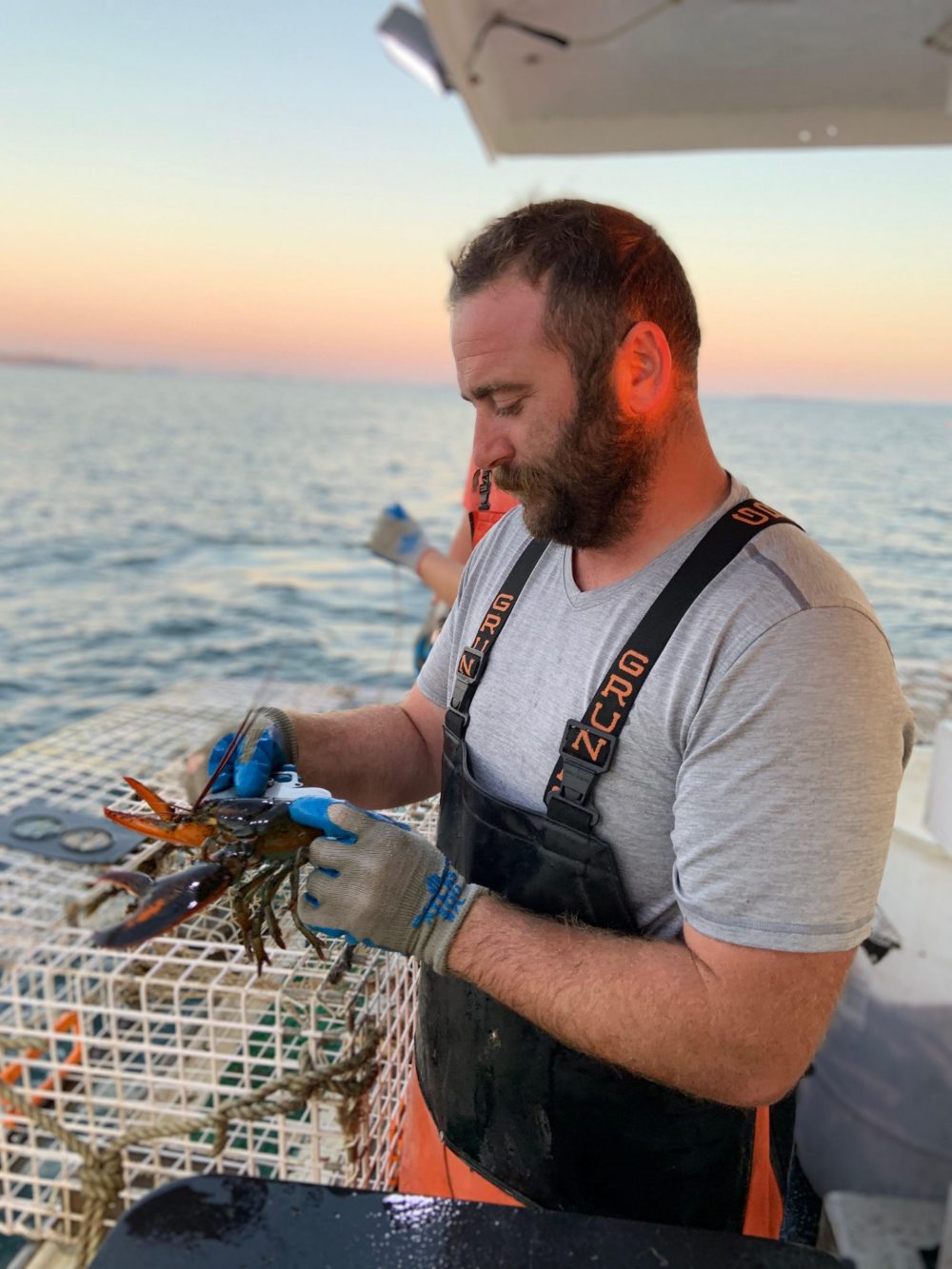Cameron Newton
“All these boats have supply, but nowhere to go.” “Our shellfish business died overnight.”
John Symonds sails his 32-foot boat out of Gloucester, catching crustaceans just as members of his family have done since the ’30s. The pandemic at hand is hammering seafood sales, and he wonders if he’s the last lobsterman in his lineage.
“This time of year, [lobsters] usually go for $8 to $10 per pound,” Symonds said in an interview. “Last week, it was $3.”
These are hard times on the high seas for the Bay State’s celebrated seafood industry. Many individuals and businesses are headed for the rocks as social distancing, closed eateries, and trade tariffs take a significant toll on the market.
Symonds continued, “I can only go out once a month until this turns around. Let’s say I’d spend $300 on bait, $200 on help, and $100 on fuel. Would have been cheaper to stay docked—I’m losing money on trips out. My dockage, mortgage, truck upkeep, and other bills stay the same.”

Fishermen in these parts critically rely on the spring harvest, which spans from about midsummer through Christmas. Already, though, they’re losing more than half their income.
“This time of the year, we might make 10 grand for the month,” Hull lobsterman Tim Walsh said. “This is like snow plowing. You don’t rely on it, but it’s great. We might get 200 or 300-pound hauls in 3 days a week. Now it’s like, Fuck, is this worth an eight-hour [day] for $400?”
As was reported in the Gloucester Daily Times, the Massachusetts Lobstermen’s Association is asking federal and state officials to change the rules so fishermen can sell their catch directly to the public, free of middlemen.
“Guys are pushing for a more direct market,” Symonds said, noting some potential short-term solutions in play. He knows there’s still a market out there. “At a time like this, people are stepping up to help out the local businesses.”
The seafood industry received $300 million in federal bailout money from the $2 trillion COVID-19 relief package. It’s a big chunk, but industry experts say losses endured by the nearly $100 billion-a-year industry are devastating, and the portion that goes to everyday fishermen won’t add up to much.
“It’s like, Holy shit, what is gonna happen?” Walsh said. “We expect low volume this time of year, but this is outrageous. This has affected the price of bait, fuel, ground fishing, herring fishing. All these boats have supply, but nowhere to go.”
Shipwrecked
There’s a lot of hardship in the wholesale market as well.
“This time of year, with spring, Lent, and family holidays, business is usually so busy,” according to Cameron Newton, who works at John Nagle Co., a wholesale seafood operation in Boston. “Instead, we have half days, people laid off, fish that are going for half the price because of low demand. There’s so much less sword and tuna from imports and certainly domestic boats too. Everything is upside down.”
So far, the only saving grace has been the business of grocery stores and small retail markets, but even they’re not buying nearly as much as they do in normal times.
“Our shellfish business died overnight,” Newton said. “We went from on a good day, selling roughly 250 bags of oysters a day, to 15, to 20—a 90 to 95% decrease. That reflects immediately how many people eat oysters at restaurants, rather than at home.”
Going into Easter Sunday last week, one business owner praised his regulars who are still buying.
“A lot of areas between here through Maine and Canada aren’t accepting catches because there is no market currently,” Lobster Express owner Ron Patuto said. “However, we will continue to accept the daily catch, support our fishermen, and move the product at reasonable wholesale prices through our retail market. With your help we can keep our fisherman, your neighbor, your friends working.”
The other problem
One country usually buys more Mass lobsters than anyone else.
“Past five years, China was our biggest buyer,” Walsh said. “We couldn’t catch enough lobsters fast enough.
“If China bounces back, we’ll be okay while the US markets rebuild. We sell domestically, but internationally is our big market.”
According to the State House News Service, the Office of International Trade and Investment informed the Commonwealth’s Joint Committee on Export Development that the trade relationship between Massachusetts and China grew from $6.5 billion to $7.8 billion between 2016 to 2018. But after President Trump hit China with a 25% tariff on exports, lobster sales dropped more than $16 million between 2018 and 2019.
Then came COVID-19…
The global crisis rocked an already shell-shocked industry, as restaurants and fisheries nationwide reported unfathomable losses.

“We’re 80% off of where we need to be to break even,” Peter Ramsden, the owner of New Bedford’s Foley Fish Company, told the Washington Post.
Meanwhile, local fishmongers are frantically weighing future options.
Division of Marine Fisheries Acting Director Daniel McKiernan told the Cape Cod Times that 70% of all seafood sold in Massachusetts is eaten in restaurants.
Scores of lauded local landmarks like Turk’s Seafood in Mattapoisett Sullivan’s at Castle Island are closed, while some restaurants and markets are rallying their skeleton crews and doing takeout and/or delivery for customers marooned inside their homes. Stalwarts like Jake’s Seafood on Nantasket Beach, the Clam Box of Ipswich, Woodman’s of Essex, and Plum Isle Grille are offering their catches curbside. In Quincy, the Lobster Stop is offering free delivery to anyone within a seven-mile radius.
Overall, the future of fishing is unclear. For the short term, the Bay State has a list of retailers that are currently open and providing local and domestic seafood. Looking out at the horizon, it’s hard for anyone to tell if the pandemic can be weathered, even considering the nearly-400 year old industry has survived hard harvests before.
“We just have to wait and see once we start setting traps again,” Walsh said. “Right now, the virus is completely killing the industry.”
There is obviously no way for a crew to properly engage in social distancing on deck, leaving workers like Walsh between the dock and a hard place.
“My friends are saying, ‘Stay home, stay home.’ I don’t have that fucking option. I have no health insurance and unemployment. We’re self reliant by nature. I have to fix my boat, I have to go out there. I have to fish no matter what.”








